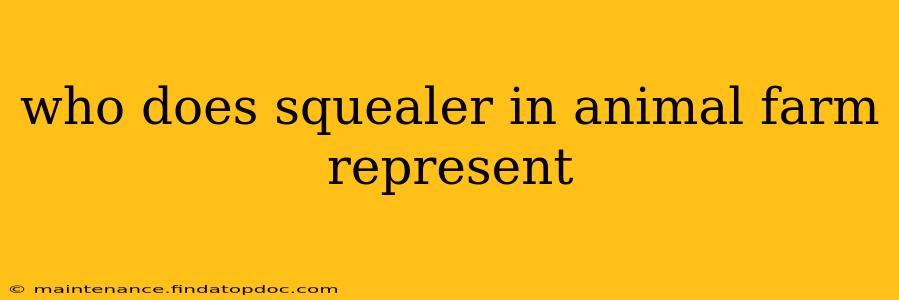George Orwell's Animal Farm is an allegorical novella, meaning its characters and events represent real-world figures and historical events. Squealer, the pig who acts as Napoleon's propagandist, is arguably one of the most chillingly effective characters in the book. His role isn't simply that of a mouthpiece; he embodies the power of manipulation and propaganda in shaping public opinion. But who, exactly, does he represent?
The most commonly cited real-world parallel for Squealer is Soviet propaganda officials and journalists during the Stalin era. These individuals were instrumental in shaping the narrative surrounding Stalin's regime, twisting facts, suppressing dissent, and creating a cult of personality around the dictator. They utilized skillful rhetoric, misinformation, and outright lies to maintain control over the public's perception of the Soviet Union's progress and Stalin's leadership. Squealer's eloquent speeches, ability to twist words, and constant stream of "facts" perfectly mirror the tactics employed by these figures.
Beyond specific individuals, Squealer's representation extends to the broader concept of propaganda itself. He demonstrates how easily manipulated the masses can be, even in the face of obvious contradictions and injustices. His ability to convince the other animals to accept ever-worsening conditions highlights the power of carefully crafted narratives and the dangers of unchecked authority.
What Propaganda Techniques Does Squealer Use?
Squealer's effectiveness stems from his mastery of several key propaganda techniques:
-
Rewriting History: He constantly alters past events to fit the current narrative, often claiming that the animals had always believed things that contradict their previous understanding. This represents the Stalinist regime's rewriting of history to support its ideology.
-
Appeal to Emotion: He uses emotionally charged language and appeals to the animals' fears and desires to manipulate them. His comforting words and assurances distract from the harsh realities of their situation.
-
Distraction and Misdirection: When confronted with inconvenient truths, Squealer skillfully changes the subject, often diverting attention to minor details or unrelated issues. This avoids direct engagement with the core problem.
-
Selective Information: He only presents information that supports Napoleon's agenda, withholding or distorting anything that might challenge his authority.
-
Slogans and Repetition: Squealer employs simple, catchy phrases and repeats them endlessly, reinforcing the desired message in the minds of the animals.
Does Squealer Represent Specific Historical Figures?
While no single person perfectly embodies Squealer, his character draws inspiration from several prominent figures associated with Stalin's regime. These might include:
-
Vyacheslav Molotov: A close associate of Stalin known for his skillful propaganda and manipulative rhetoric.
-
Lavrentiy Beria: The head of the NKVD (secret police), responsible for widespread terror and suppression of dissent. While not a direct propagandist, his actions created an atmosphere of fear that allowed propaganda to flourish.
-
Various Soviet Journalists and Writers: Countless individuals actively contributed to the Soviet propaganda machine, writing articles, producing films, and crafting narratives that supported Stalin's agenda.
In conclusion, Squealer is a powerful symbol representing not just specific historical figures but the broader dangers of unchecked power, manipulative propaganda, and the vulnerability of the masses to persuasive rhetoric. His character serves as a stark warning about the importance of critical thinking and resisting manipulative forces.
